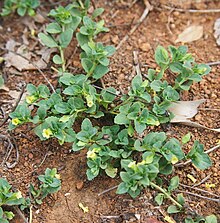Mecardonia (axilflower) is a genus of herbaceous plants in the family Plantaginaceae. 31 species have been described,[3] of which 12 are accepted. Its distribution is predominantly in South America, and South East United States, including Florida [4] [5] and Alabama[6] [7] but may be found as far north as Virginia. [8](see map)[9] Five species are found in Argentina[10] and three in the US.[11]
| Mecardonia | |
|---|---|

| |
| Mecardonia procumbens | |
| Scientific classification | |
| Kingdom: | Plantae |
| Clade: | Tracheophytes |
| Clade: | Angiosperms |
| Clade: | Eudicots |
| Clade: | Asterids |
| Order: | Lamiales |
| Family: | Plantaginaceae |
| Tribe: | Gratioleae |
| Genus: | Mecardonia Ruiz & Pav. |
| Species[1][2] | |
|
Mecardonia acuminata | |

Description
editThey are herbaceous procumbent glabrous plants. They are mostly blackened when they are dry. Their stems are 5–40 cm in length and they have 4-alate leaves. Ovate leaves 7–25 mm in length and 3–16 mm wide, with a crenate edge; petiolate. Solitary axillary flowers, pedicles 8-20 (-26) mm in length, basally bibracteolate; 5-lobed calyx, with unequal lobes, more or less free to the base, imbricate, the adaxial lobe widely lanceate to ovate, 5–9.5 mm long and 3–6 mm wide, slightly accrescent, the 2 middle lobes longer and overlapping, the 2 abaxial lobes nearly the same size as the adaxial and overlapping the middle lobes; 5-lobed corolla, 7–8 mm long, yellow with purple at the throat, bearded at the mouth; 4 fertile stamens. Ovoid fruit capsule, 5–7 mm long, loculicidal; ovoid, reticulated seeds.[12]
Taxonomy
editThe genus was described by Ruiz & Pav., published in Florae Peruvianae, et Chilensis Prodromus 95. 1794. [12][13] The type species is: Mecardonia procumbens Ruiz & Pav. The genus is named after Antonio Meca y Cardona, who founded the botanical gardens in Barcelona, in 1784.[14][15] [16]
Rossow (1987) in his taxonomic revision of the genus, recognized ten species. A new species, M kamogawae, was identified in Argentina by Greppi and Hagiwara (2011).
Cultivation
editSold as an ornamental garden flower, such as Mecardonia Magic Carpet Yellow, as annuals in colder areas.
Species
edit- Mecardonia acuminata (Walter) Small.
- Mecardonia berroi Marchesi
- Mecardonia caespitosa (Cham.) Pennell
- Mecardonia exilis (Brandegee) Pennell
- Mecardonia flagellaris (Cham. & Schltdl.) Rossow
- Mecardonia grandiflora (Benth.) Pennell
- Mecardonia herniarioides (Cham.) Pennell
- Mecardonia procumbens (Mill.) Small
- Mecardonia pubescens Rossow
- Mecardonia serpylloides (Cham. & Schltdl.) Pennell
- Mecardonia tenella (Cham. & Schltdl.) Pennell
References
edit- ^ USDA
- ^ The Plant List
- ^ Mecardonia on PlantList
- ^ Atlas of Florida Vascular Plants: Mecardonia
- ^ The Institute for Regional Conservation
- ^ Gardening in the Coastal Southeast
- ^ Alabama Plant Atlas: Mecardonia
- ^ Digital Atlas of the Virginia Flora
- ^ Map of distribution
- ^ Alderete, L.; Mori, M.; Kato, A.; Escandón, A.. Establishment of an in vitro micropropagation protocol for Mecardonia tenella. Electronic Journal of Biotechnology, North America, 915 06 2006.
- ^ a b c d Adjoa Richardson Ahedor. Systematics of the Mecardonia acuminata (tribe Gratioleae, Plantaginaceae) complex of southeastern USA
- ^ a b "Mecardonia". Tropicos.org. Missouri Botanical Garden. Retrieved 20 January 2013.
- ^ Forzza, R. C. et al. 2010. 2010 Lista de espécies Flora do Brasil. Archived 2014-03-26 at the Wayback Machine
- ^ Barcelona: Pel medi ambient. Universitat Gardens
- ^ Idárraga-Piedrahita, A., R. D. C. Ortiz, R. Callejas Posada & M. Merello. (eds.) 2011. Fl. Antioquia: Cat. 2: 9–939. Universidad de Antioquia, Medellín.
- ^ D. Miguel Colmeiro (1858). Mecardonia. La Botánica y los botánicos de la Península Hispano-Lusitana- Estudios Bibliográficoa y Biográficos. Madrid:Imprenta Rivadeneyra.
Sources
edit- Rossow, R. A. 1987. Revisión del género Mecardonia (Scrophulariaceae). Candollea 42: 431–474.
- Cappellari, S. C., Harter-Marques, B., Aumeier, P. and Engels, W. (2009), Mecardonia tenella (Plantaginaceae) Attracts Oil-, Perfume-, and Pollen-Gathering Bees in Southern Brazil. Biotropica, 41: 721–729. doi: 10.1111/j.1744-7429.2009.00529.x
- Krishne Gowda, M Magaraj. Embryological studies in Mecardonia procumbens (Miller) small. Proceedings: Plant Sciences February 1983, Volume 92, Issue 1, pp 5-18
- Kaul, M. L. H. Cytogenetical Studies on Ecological Races of Mecardonia dianthera (SW) Pennell. Cytologia 34.2 (1969): 178-187.
- Julián A. Greppi, Juan C. Hagiwara. UNA NUEVA ESPECIE DE MECARDONIA (PLANTAGINACEAE). Darwiniana Vol 49, No 1 (2011) p. 43
- Barringer, K. & W. Burger. 2000. Family 193. Scrophulariaceae. In: W. Burger (ed.), Flora Costaricensis. Fieldiana: Botany, n.s. 41: 1–69.
- Nelson, C. H. 2008. Cat. Pl. Vasc. Honduras 1–1576.
- Stevens, W. D., C. Ulloa Ulloa, A. Pool & O. M. Montiel Jarquin. 2001. Flora de Nicaragua. Monogr. Syst. Bot. Missouri Bot. Gard. 85: i–xlii,.
- Tropicos: Mecardonia
External links
edit- Galapagos Species Checklist: Mecardonia procumbens
- PPP-Index Search for Mecardonia.